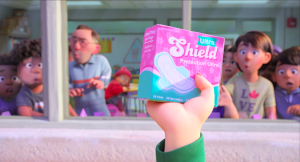Back in March, Disney released a new Pixar animation film called ‘Turning Red.’ The film is set in the city of Toronto, Ont., and centres around the 13 year-old Chinese-Canadian girl, Meilin Lee, who suddenly happens to turn into a giant red panda. The whole story is a metaphor for puberty, and how girls turn red, or rather menstruate during this period of transition. The launching of this movie coincides with a significant change the University of Guelph-Humber has been going through during recent years, the availability of free menstrual products to students and consequently the importance of breaking a taboo.
In 2017, Allisa Lim, a former Humber College business student and IGNITE’s former vice-president, brought up a brand new initiative to Humber and the University of Guelph-Humber respectively as part of her campaign, menstrual equity for all.

Allisa Lim with IGNITES’ free menstrual kits back in 2018 Photo: IGNITE
Allisa says that the idea of free menstrual products on campus came from her own experience of living by herself. “I lived by the Lakeshore North campus in student housing. Before that I never had to purchase menstrual products, I was very privileged that my family would purchase those items for me. So realizing, when I was living alone, how much it costs, how much it adds up, how much I would have to sometimes negotiate what products I would get. So that was quite an experience itself,” she says.
Lim adds that the number of emotions that someone who menstruates goes through when forgetting to bring their own products is another overwhelming experience, especially for her in particular. “It’s more so me, but I know a lot of people experience this, because I have regular periods and I would never remember to bring menstrual products to campus. One time I went to the washroom before class and I had gotten my period. I had no products and ended up having to go home and miss half of my class,” she says. “Then you start to realize when people who menstruate and don’t have their products, they experience a number of things, they experience stress, anxiety, and anger even sometimes. So it was about the idea of creating a security blanket on campus so they can focus on their studies, they don’t have to worry about purchasing menstrual products.”
When it comes to the importance of talking about menstruation, Lim says that there are different aspects to it, such as period poverty, high costs of period products, and the taboo itself.
“When you hear about period poverty some people have their own notions, but what it is is people who are menstruating not being able to purchase any products because of their status,” she says. “So in turn they have to resort into other different things in replacement, this could look like rolling up towel rags as tampons which inevitably causes bacteria.”
According to UNICEF, period poverty is a global issue that affects millions of people every year around the world. Around 2.3 million people live without basic sanitation, making it harder for most of them to deal with poor menstrual hygiene.
Lim points out the issue with the costs of these products. “Another thing about the importance of talking about menstruation is how expensive these products are. Everything else is free in the washroom and those are necessities, but why aren’t pads and tampons?” she says.
According to research, an average menstruating individual spends around $6,360 with period products in their reproductive lifetime, 12 to 52 years old.
Not only is the lack of assistance for individuals who menstruate a huge issue, the stigma is even more harmful, impacting millions as well. In 2019, a survey made by the organization Plan International Canada, demonstrated that around 58 per cent of female respondents said they occasionally or regularly felt the need to lie about being on their period or hide a menstrual product. As well as 41 per cent of them have also said they’ve been occasionally or regularly teased by a male about being on their period, including by friends, colleagues and relatives.
Allisa says that the stigma around menstruation has come from a long history of negative views about periods. “The history back in the day was that anyone who menstruated wasn’t even allowed to go to church, they couldn’t even cook or clean at their house. They had to sit in a separate place outside of their home. They weren’t able to go to school,” she says. “So that kind of history of menstruation trickles down to where we are today.”
She says that as a society we have come a long to openly discuss about it, but we are still have a long way to go on breaking this taboo. “We are still trying to breakdown the stigma of holding your pad or tampon down in your pockets or in your sleeves and walking to the washroom secretly. Or even whispering ‘I’m on my period’,” she says.
Lim had to go through research, surveys, and consultations with Humber’s administration and other colleges in order for her to pitch the idea to IGNITE, the student union representing students at both Humber College and the University of Guelph-Humber . “When you do any sort of project management sometimes you wanna start with ‘how,’ but you actually have to halt yourself and start with the ‘why,’” she says. “So a lot of it was trying to find my purpose for the menstruation project, my purpose was to provide free menstrual products to students on campus, breaking down the taboo, and also talking about inclusivity.”
To Allisa, embracing the LGBTQIA2S+ community in the project was extremely important when tailoring it, especially to one of her family members. “We are now changing the narrative when it comes to menstruating, rather than ‘women or girls who menstruate,’ we are changing the narrative to ‘people who menstruate,’ because people who identify as trans also menstruate still,” she says. “This I learned from my own brother actually, my brother is trans female to male, to him it was really important to have him in my mind in creating this project.” She also made sure the products had gender neutral colours to enhance the inclusion.
According to Nicole Mitskopoulos, the current manager of IGNITE’s Student Wellness, things have since changed from the 2017 initiative of free menstrual products, they are not only focusing on period equity, but also sustainability. “We have now expanded our program to include sustainable period products. Students can choose from menstrual cups, reusable pads, reusable liners and period underwear,” she says. Mitskopoulos also adds, “there are a limited number of vouchers available—so, whether you’re looking to add more sustainable menstrual products to your collection or curious to try them out, now’s your chance to make your next cycle waste-free. We have received so much positive feedback.”
Lim has high hopes for the future of universities, colleges and high schools across Ontario to implement free menstrual products at their institutions. “I think we are doing a pretty good job at it so far. I just had a meeting with Nadya Okamoto, the author of ‘Period Power,’ a huge leader and huge changemaker in the ‘period-menstruating world.’ We just had that [meeting] on International Women’s Day with ten other schools across Ontario. This was great because all of these schools that participated have their own menstruation projects. So I do see that across Canada it has been put to work,” she says.
The period poverty in the media

Turning Red (2022) Photo: Disney/Pixar
The open conversations about periods, pads and tampons in schools is little to none, let alone in the media. Even though the movie ‘Turning Red’ is a metaphor for growing up and dealing with puberty, such as getting periods, the situation still is addressed directly as well. At a certain moment, Meilin Lee’s mother, Ming Lee, is anxiously worried about her daughter getting her period and going to school. She prepares everything for her daughter to deal with this process, which consequently makes her run across the schoolyard and expose to everyone that Meilin might be getting her period when she waives a pad in front of the whole class. Now, imagine if there were free menstrual products at Meilin’s school and menstruation was treated normally by everyone? This surely would not happen.
In an interview with the entertainment news website, Uproxx, the Chinese-Canadian director of the film, Domee Shi, says this was a way of representing girls going through puberty that it is not usually seen. “You don’t see that very often in movies and TV shows. And I think that’s precisely why we wanted to put it in the movie,” she says. “It’s so weird because it happens to every woman, every girl, but you just don’t hear about it or talk about it and it’s awkward and crazy, but we all go through it.”
She goes on to say that having that situation brought up in the movie was a form of authenticity when it came to telling a girl’s coming of age story. “If we wanted to tell a story about a girl going through puberty, we had to talk about her getting her period,” she says.
Allisa Lim, says that growing up with the media never mentioning periods only enforces the taboo around it. “We grew up in a time of media that menstruation is never spoken about which contributes to the taboo,” she says. Allisa points out that even popular TV shows such as Friends, that has three female protagonists, fail to represent this life experience. “Friends has eight or 10 seasons, and menstruation or periods is only ever mentioned once. And they are talking about their everyday lives, they wake up, you see their morning routines, their night routines, but no one in there ever mentions them menstruating,” she says.
The Canadian animated series, Braceface, was one of the very few cartoons targeted to young audiences to address menstruation back in the 2000s. The main character, Sheron, was a teenager dealing with puberty and eventually goes through the experience of getting her first period throughout the series.

Braceface (2001-2004) Photo: Teletoon
In an interview with Dr. Lauren Rosewarne, the author of Periods in Pop Culture, she says that the importance of representation of menstruation on-screen is part of reality and therefore should be depicted, especially to a young demographic. “It’s important that audiences see themselves and their lives – in all its diversity, in all its messiness, in all its realism – on screen,” she says. “Periods are part of reality and thus seeing it depicted is important. This importance and relevance is, of course, sharper for younger people for whom the experience is still new and often terrifying, embarrassing and misunderstood.”
Lim recalls how terrifying it was to get her first period since no one talked to her about it before. “I thought the world was ending when I had my period, I was so scared, so worried, I didn’t know what to do. I didn’t know what was happening to my body. So, it is about educating young audiences, our younger generation,” she says.
Although Rosewarne believes that on-screen periods are necessary to also fight the stigma around them, she warns that they can perpetuate it as well. “Through jokes about PMS, mood swings to blood leakage leading to ridicule, film and television give an informal education about menstruation and frequently this involves framing it negatively and thus perpetuating stigma about it,” she says.
As her book was published back in 2012, exactly 10 years ago, Rosewarne says that currently the growth of streaming services has been expanding the depiction of menstruation. “There is, of course, always room for improvement, but in the years since I wrote my book we’ve seen the rise of streaming services and with that much greater risk-taking in media production including with an increase in the visibility of menstruation,” she says.
When advising on how film and TV can help fight the stigma she goes on to say “stigma can be fought through depictions that help to normalise menstruation instead of demonising or glamorising it.”
Rosewarne says that more frank portrayals of it can open doors to other creators to do the same, even though films and TV shows don’t have their primary focus on educating audiences about it. “Directors will always be looking for creative ways to tell their stories – in line with their values – and as the public becomes more acclimatized to more frank portrayals I suspect we will see more of them,” she says. “We must always remember that film and television exists to entertain and make money: its primary function is not to educate or socially engineer.”
Lim, who said she loved the film Turning Red, says that “it is so wonderful that a coming of age film for a younger audience and for teens to talk about menstruation in this way because it teaches young persons who are about to menstruate or even people who do not menstruate that this is normal, that this part of growing up, that is a normal part of our body and our system.”
Period poverty, in both schools and in the media, is not only an issue that concerns individuals who menstruate, but rather society as a whole. The lack of frank portrayals and the need for period equity are issues that have to be solved for people to see themselves being represented and to know that they have a safety net that cares and is there for them during this life experience.
Period.
